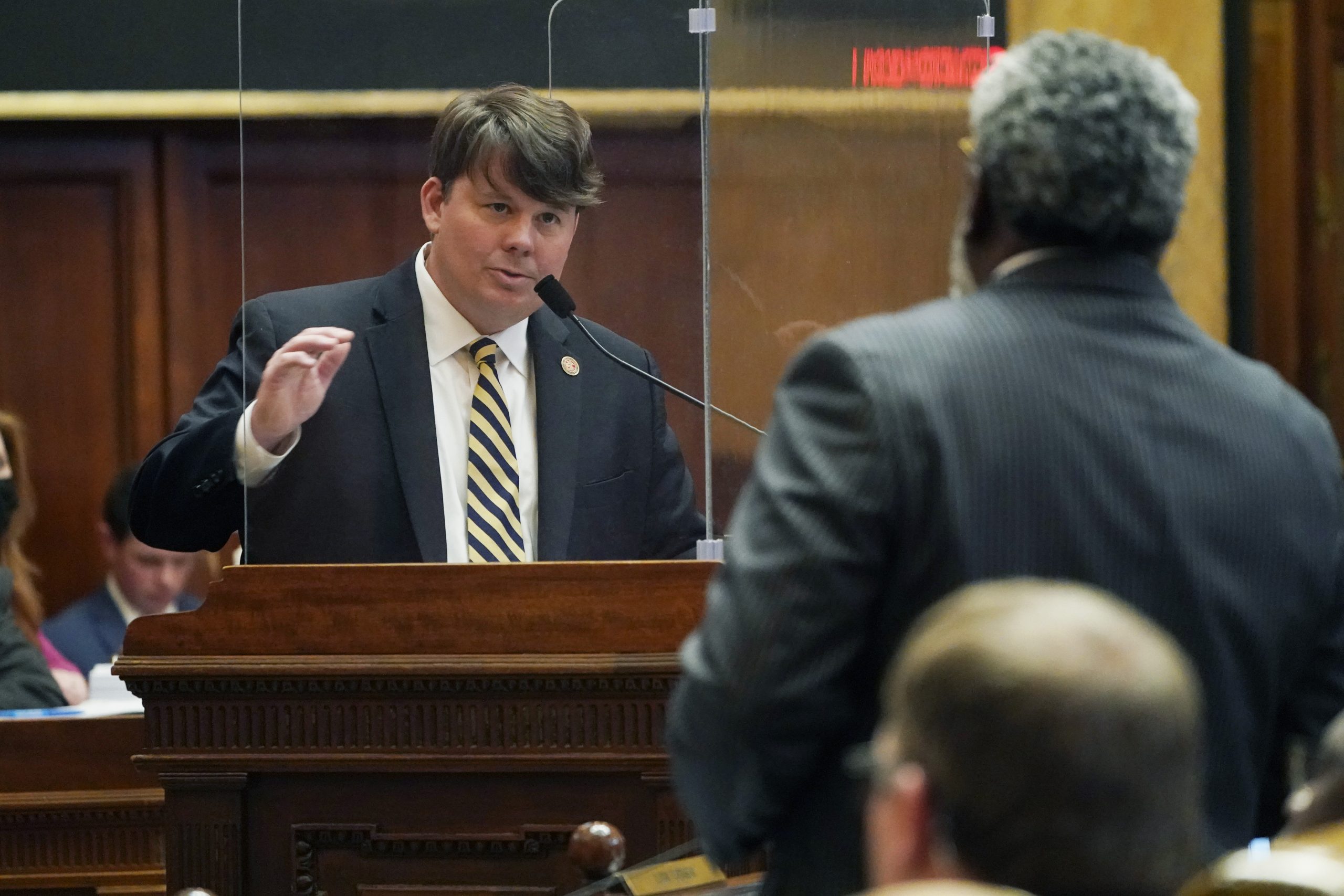Mississippi Today
This man could save the lives of countless Mississippi mothers

This man could save the lives of countless Mississippi mothers
Note: This editorial anchored Mississippi Today's weekly legislative newsletter.Subscribe to our free newsletterfor exclusive access to legislative analysis and up-to-date information about what's happening under the Capitol dome.
Every so often in Mississippi politics, there are moments for unexpected heroics — cracked windows of opportunity when someone stands up to lead and does something so brave that it's remembered for years down the road.
For the next 36 hours or so, one little-known elected official will be sitting alone, squarely in front of that window. He has to decide whether to reach out and open it or let it fall closed.
State Rep. Joey Hood, a 46-year-old Republican from Ackerman, could buck his party leaders and pass a policy that more than two-thirds of Mississippi voters want, that every major medical association in the state wants, that the majority of the GOP-led Senate wants, and that the majority of his GOP-led House wants.
Passing postpartum Medicaid extension would increase health coverage for new, poor mothers from two months to 12 months. It's a common-sense deal passed by dozens of other states that would tremendously help moms and kids in Mississippi, which boasts one of the highest maternal mortality rates and the highest infant mortality rate in the nation. And it would cost the state just $7 million per year — a drop in the bucket given our current $3.9 billion surplus.
READ MORE: Majority of lawmakers support postpartum Medicaid extension, Mississippi Today survey shows
Despite its broad popularity and clear need, Speaker of the House Philip Gunn continues to block it, saying he doesn't support Medicaid expansion in any form and doesn't see the health benefits of providing health care to the mothers. And Gov. Tate Reeves, who legislative leaders say could sign the policy into effect himself without their approval, reversed his long opposition on Sunday and said he wants lawmakers to pass it.
But Hood, a husband and father of two young boys, could take matters into his own hands this week. The Senate bill that would extend postpartum Medicaid, which passed overwhelmingly earlier this session, was assigned to the House Medicaid Committee, which Gunn appointed Hood to lead. The bill must pass out of his committee by midnight on Tuesday, Feb. 28, to stay alive.
In the past three terms, Gunn has corralled nearly complete power over bills that enter the House of Representatives. He demands loyalty from his committee chairs and has strategically created an “inner circle” of Republicans most faithful to him. That way if Gunn wants a certain bill to die, he knows his hand-picked chairs will dutifully follow his lead, keeping the bill from being debated in their committee until it dies a quiet and unseemly death at deadline.
Hood, first elected in 2011, is indeed one of Gunn's “inner circle” Republican chairs and a most loyal soldier. That was evident earlier this session when Hood refused to call a Medicaid Committee meeting, ensuring his House colleagues would not have the chance to even debate the House version of postpartum Medicaid extension.
But whether the speaker likes it or not, Hood possesses the power to place the Senate bill on his committee's calendar for debate and consideration this week. The speaker, who reiterated last week he does not support postpartum Medicaid extension, cannot legally stop Hood from bringing the bill up in his committee. And if Hood brings it up before his committee, it would almost certainly pass, based on the Mississippi Today survey of House members.
So why would Hood go so directly against Gunn's wishes? Why is this deadline different? Why is there a cracked window of opportunity?
Because for the first time in 12 years, Gunn's power is waning in a very real way. The speaker announced last fall he would not seek reelection to his House seat, meaning this current legislative session is his last not just as speaker but in the Legislature. He's as lame a duck as there is in politics.
Entering this session, there was broad speculation about how Gunn's final year on High Street might play out. There's been some behind-the-scenes power positioning happening, with several longtime House Republicans maneuvering to become the next Speaker of the House. But the heir apparent to the speakership is state Rep. Jason White, who has been Gunn's right-hand man for several years.
Last week, the lame duck reality became clear when House Republicans handed Gunn what must be the single most bitter defeat of his career. At least 25 House Republicans blocked what he calls the single biggest goal of his political life: eliminating the Mississippi income tax. To make matters worse for Gunn, the stand came in a closed-door Republican caucus meeting — a setting famously used by the speaker for years as a power tool to whip votes for his desired policies.
READ MORE: How House Republicans are avoiding tough votes on health care solutions
Fresh off the first big dramatic change of this new House order, it's unclear what Hood will do. Last week, when a Mississippi Today reporter asked him a handful of questions about whether he'll let the Senate bill come up for a vote in his House committee by deadline, he repeatedly answered: “We're just going to continue to work it through the process.”
But if he's thinking clearly about the process and whether to reach out and open the cracked window, he should consider a few things.
First, Gunn's waning power will very soon fade into complete darkness. When the April 2 end to the 2023 legislative session arrives, it's White's gavel to lose. For what it's worth, White told Mississippi Today he was “undecided” on whether to extend postpartum Medicaid coverage for new moms. That's an obvious tell that he is at least open to considering the policy if not outright in support of it.
Second, the earliest Hood could face any political consequences for any decision is August of 2027. He is among the 40% of state lawmakers who has no single challenger in the 2023 election, meaning his reelection is guaranteed. And if he were to bravely buck Gunn's wishes this week, it would be tough for any 2027 challenger to argue that it was the wrong thing to do, especially given the immense public popularity of the policy.
Lastly, it's the right thing to do. And he doesn't have to take it from this journalist. He can take it from the countless physicians, nurses, mothers, children and everyday Mississippians that have all but gotten down on their knees to beg. He can take it from 27-year-old Chelsea Brooks of Florence, 32-year-old Courtney Darby of Heidelberg, 30-year-old Kristen Elliott of Brandon, 31-year-old Laura McCardle of Copiah County, or 32-year-old Emma To of Madison County — real Mississippi mothers who have important postpartum stories to share.
What will they remember about Rep. Joey Hood years from now?
READ MORE: ‘Mississippi moms can't wait': Doctors urge legislators to extend postpartum coverage
This article first appeared on Mississippi Today and is republished here under a Creative Commons license.
Mississippi Today
Senate confirms Gov. Tate Reeves’ economic development chief despite report of toxic workplace, claims of harassment
The Mississippi Senate on Wednesday unanimously confirmed Bill Cork as Gov. Tate Reeves' pick for a permanent chief economic development officer, despite a background report provided to senators that he “created a toxic workplace” and had faced complaints including sexual harassment and creating a hostile work environment.
In a hearing before his Senate confirmation, Cork said he did nothing wrong, has a winning economic development record, has overhauled MDA.
“… If that takes a little hostility to get that done, that's what's going to happen,” Cork said in the hearing on Tuesday.
Cork is now the first permanent director of the state's economic development agency since 2021, when former agency director John Rounsaville resigned after sexual misconduct allegations.
Cork is credited with recently helping the state land record-setting large economic developments, including Amazon Web Services' commitment to spend $10 billion to construct two “hyperscale data centers” in Madison County.
A background report provided to the Senate Finance Committee before members voted to confirm him said that Cork, who has worked at MDA since September of 2020, was investigated by the Mississippi Personnel Board in 2021. The investigation followed a claim against Cork of sexual harassment, age discrimination and creating a hostile work environment while he was serving as chief economic development officer at MDA.
The personnel board said it conducted the investigation at Gov. Reeves' request. It submitted a report to Reeves after the investigation that said Cork had been uncooperative with the investigation, and that while no legal violations were found, “Cork's management style has created a toxic workplace.” Personnel recommended Cork receive a written reprimand and that he complete at least 12 hours of training on workforce harassment, which he completed.
Cork was traveling Thursday, his office said, and could not be reached for comment. In a Senate Finance confirmation hearing on Wednesday, Cork addressed the report after Sen. Bradford Blackmon asked about it.
Cork said he helped lead “reorganizing and reforming” MDA, resulting in two-thirds of the project management and international teams leaving the agency, and “we had a small cadre of employees that didn't like what was happening.”
“At the end of the day, the state Personnel Board found I hadn't done anything illegal, but that I was a tough boss,” Cork said. “Some people find that level of tough and directedness to be a little hostile. None of it was directed at anyone, but when you're trying to put together a winning team, you just don't settle for second-place.
“… I don't apologize for anything I've done because I didn't do anything wrong,” Cork said. “I didn't cooperate with the investigation because I didn't do anything wrong, and that's exactly what that investigation found.”
State Personnel Director Kelly Hardwick said: “Regretfully, (Cork) didn't cooperate with the investigation, which might have changed our determination. Because he didn't, we were left with only the testimony of the accusations.”
Hardwick declined to provide details of the allegations against Cork, and his office would not release its report to Mississippi Today, citing public records exemptions for personnel records.
Hardwick said Cork did successfully complete the state workplace harassment training and implemented some of the practices recommended in the training.
“He's been shown to be successful and there have been no other complaints on him since,” Hardwick said. “From our standpoint he successfully did what we recommended to the governor.”
Both the Senate Finance Committee and full Senate voted unanimously for Cork's confirmation.
Senate Finance Chairman Josh Harkins noted the report said personnel board found no legal violations, and that Cork openly addressed the allegations in committee. He said he received recommendation letters for Cork from across the state and country and, “It's hard to argue with the product MDA has put out in the last few months.”
A spokesman for Reeves praised Cork, said the “old” personnel complaint is not credible and criticized Mississippi Today.
“Bill Cork has gotten better results for the people of Mississippi than almost any other employee of state government in decades,” Reeves Deputy Chief of Staff Cory Custer said in a statement. “… (Cork) opted to make the results of the investigation known, addressed it in detail in his confirmation hearing yesterday, and was then unanimously confirmed. It would not be a surprise to see a biased article that hypes up discredited nonsense, but it would be a disservice to a great, hard-working man.”
Cork has previously served as deputy director and chief economic development officer at MDA. He formerly led the Hancock County Port and Harbor Commission and before that was the CEO of an industrial complex in New Boston, Texas. He is a Marine Corps veteran and received a master of Urban and Regional Planning from the University of Illinois at Urbana-Champaign.
Reeves on Aug. 13, 2021, announced Cork's predecessor, Rounsaville, would be “stepping down” at the end of that month as MDA director to spend more time with his family and less time traveling. Reeves thanked him for his service and wished him well.
But Mississippi Today reported that sexual misconduct allegations had led to Rounsaville's resignation, and that Reeves had in July received a personnel investigation report and recommendation Rounsaville be fired. After that report, Reeves said Rounsaville had been put on administrative leave and removed from day-to-day operations at MDA and that his resignation had been tendered Aug. 13 after an investigation into his conduct.
An allegedly intoxicated Rounsaville allegedly made sexual advances toward three subordinate female MDA employees at a bar in Biloxi while attending a business conference.
This article first appeared on Mississippi Today and is republished here under a Creative Commons license.
Mississippi Today
Her grandfather helped bring Medicaid to Mississippi 55 years ago. Today, she’s pushing for expansion.
Supporters of Medicaid expansion would argue that it is wholly appropriate that Leah Hendrix has recently been a featured speaker in rallies at the state Capitol in favor of providing health care coverage for primarily working poor Mississippians.
No doubt, her activism brings symmetry.
Hendrix, a Jackson mother of four and the wife of a physician, is the granddaughter of Alton Cobb, the state's former longtime state health officer who played a pivotal role in Mississippi opting into the original Medicaid program 55 years ago.
In more recent times, her father, Tim Alford, a Kosciusko physician, was beating the drums in favor of Medicaid expansion longer than almost any other Mississippi health care provider.
“He said he was leaving that to me because no one had listened to him,” she joked in an interview with Mississippi Today this week after one of the Capitol rallies.
Medicaid expansion has become the major focus of a contentious 2024 legislative session, with hundreds of Mississippians, top state business leaders, health officials and even religious leaders publicly advocating at the Capitol for full Medicaid expansion that stands to significantly help the poorest, unhealthiest state in the nation.
For the first time, state lawmakers are earnestly debating expansion. Hendrix has been on the front lines of the fight to get it across the finish line.
“It seems we have been talking about this for more than 13 years,” she said, referring to the fact that the Affordable Care Act was passed in 2010 with the provision allowing Medicaid expansion to cover those earning up to 138% of the federal poverty level or about $20,000 annually for an individual. “But it really has been going on much longer than that. When did Al work on that?”
READ MORE: Top Mississippi business leaders endorse full Medicaid expansion
The story of Alton Cobb and Mississippi's reluctant decision to opt into Medicaid in 1969 is one of an unlikely alliance and political courage by a governor who eschewed his political philosophy to do what he believed was right for the people of Mississippi.
That governor was John Bell Williams. And Cobb, an employee at the state Department of Health who was initially reluctant to take a key position on Williams' staff, helped the governor reach that decision.
“I didn't vote for him,” Cobb told Mississippi Today in 2019, recalling when he was approached to work for Williams. “I think he probably knew that.”
But former U.S. Rep. David Bowen, who had joined Williams' staff, was a friend of Cobb and convinced him of the potential of Williams' health advisory board.
“I wanted to be part of that,” Cobb said.
READ MORE: Is history repeating itself on Medicaid expansion in Mississippi?
The panel held hearings across the state, listening to health care providers and others. Cobb said Williams attended the meetings, though he seldom spoke. He primarily listened.
At the end of the process, Williams informed his staff he was calling a special session to take up the issue of opting into the Medicaid program. That special session lasted from July 22, 1969, until Oct. 10. In the midst of the long and extraordinary session, Hurricane Camille ravaged the Mississippi Gulf Coast.
But by the end, Mississippi opted into the Medicaid program as most other states had already done.
The Williams-backed move was a shock to many political observers. As a U.S. House member prior to being elected governor, Williams had voted against the legislation to create the Medicaid program and had campaigned for governor railing against the excesses of the federal government.
But in a joint session of the Legislature on the first day of the special session, he told members, “In fairness, I must point out that my philosophical reasons for resisting the program as a member of the United States Congress is neither relevant nor applicable to the present issue before us. The program is a reality. It is available to our state and now devolves wholly into a question of whether you, in your wisdom, should determine our participation will be in the best interests of our state and people.”
Back in 1969, Williams' argument for opting into the original Medicaid program sounded much like the one made today for Medicaid expansion. He said the program would provide health care for a segment of the population that needed it, it would help the state's health care providers, and it would benefit the whole state by pumping more funds into the economy.
“Al used to love to tell about becoming John Bell Williams' chief ambassador for starting Medicaid in Mississippi,” Hendrix said. “… After having several meetings, a light came on for Williams.
“… Two opposites politically flew around the state (on the state plane) selling Medicaid,” Hendrix continued. “Al did not like to fly.”
But she added it was “a good example of a politician who did a 180 because it just made economic sense.”
Hendrix said her grandfather, who died in 2021, wanted his support for Medicaid expansion to be included in his obituary.
Hendrix is hopeful that current Mississippi politicians will do as Williams did back in 1969 and set aside their previous political beliefs and do what is right for the people of Mississippi.
“Despite the stereotypes, Medicaid does so much good,” she said. “This is the insurance that helps children who have no other choice. Where are the Beatitudes when our neighbors need them? I will never understand why Mississippi politicians of late have decided we should not expand — turning down millions of federal dollars our state so desperately needs because of politics while we're all still paying into a system that's funding states that did expand.”
Perhaps today's politicians need someone like Alton Cobb to help them reach that decision. Maybe that person is already part of the debate and is advocating for it at the Capitol every day — if only those Mississippi politicians would do like John Bell Williams did in 1969 and listen.
READ MORE: Medicaid expansion negotiators still far apart after first public meeting
This article first appeared on Mississippi Today and is republished here under a Creative Commons license.
Mississippi Today
Jackson officials settle lawsuit over George Robinson’s death
The family of a Jackson man who died in 2019 days after an interaction with police officers will receive nearly $18,000 in a wrongful death lawsuit settlement.
That $17,786.25 settlement, according to city council documents, “does not constitute an admission of liability” by the city of Jackson and the three former Jackson police officers who the family say pulled 62-year-old George Robinson from his car and beat him in the Washington Addition neighborhood.
Robinson died days later on Jan. 15, 2019, and the state medical examiners said his death was a homicide from three blunt head injuries.
One of the officers, former detective Anthony Fox, was convicted of culpable-negligence manslaughter in 2022, receiving a 20-year sentence with 15 years suspended. Charges against the other two officers, Desmond Barney and Lincoln Lampley, were dismissed in 2021.
Fox's conviction stood for about two years, until January when the Mississippi Court of Appeals reversed the conviction and issued an acquittal. In a majority opinion, the judges agreed the evidence was insufficient for the verdict and that Robinson's medical history made it difficult to tell whether his injuries from Fox was the sole contributor to his death.
The Hinds County district attorney did not support challenging the conviction, while Attorney General Lynn Fitch asked for it to be reversed.
Fox left prison in February and went back to work for the Clinton Police Department, where he was employed up until his conviction after leaving the Jackson Police Department.
Bettersen Wade, Robinson's sister who was a plaintiff in the wrongful death lawsuit, is also the mother of 37-year-old Dexter Wade, the Jackson man who died last year and was buried in the Hinds County pauper's grave, despite having identification and his family calling the coroner's office and Jackson police.
This article first appeared on Mississippi Today and is republished here under a Creative Commons license.
-
Mississippi News6 days ago
What this means for local schools
-
228Sports4 days ago
From Heartbreak to Hoop Dreams: Pascagoula Panthers Springboard from Semifinal Setback to College Courts
-
Mississippi News4 days ago
2 dead, 6 hurt in shooting at Memphis, Tennessee block party: police
-
Mississippi News6 days ago
Willis Miller sentenced to 45 years in prison, mandatory
-
Mississippi News3 days ago
Forest landowners can apply for federal emergency loans
-
Mississippi Today6 days ago
The unlikely Mississippi politician who could tank Medicaid expansion
-
Mississippi News5 days ago
Burnsville man arrested in Prentiss County on drug related charges
-
Mississippi News2 days ago
Cicadas expected to takeover north Mississippi counties soon































